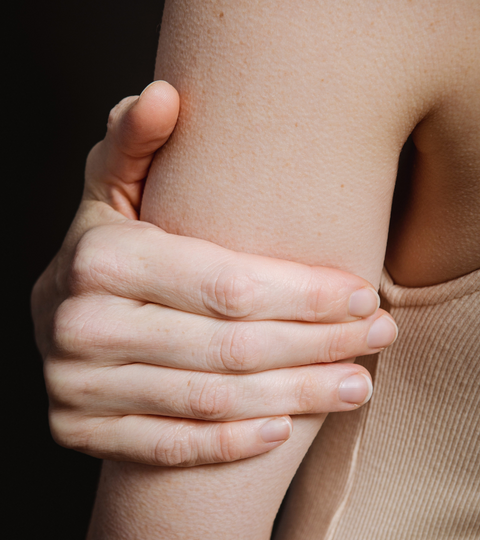‘Sensitive skin’ turns up millions of search results in Google, but in truth it’s a confusing topic. If skin reacts to harsh actives or experiences redness from time to time, does that mean it’s actually sensitive?
It's a valid question, and one that’s tricky to pin down – especially when it comes to determining the exact cause of your symptoms. Below we shed light on the difference between ‘sensitive’ and ‘sensitised’ skin, common causes, and our favourite formulations to keep things in check.
What does sensitive skin mean?
Sensitive skin is most often used as a blanket term to describe a bunch of issues, including redness, irritation, bumpy texture, itching, flaking, discomfort and ‘warmth’.
Sensitivity can be temporary or ongoing and can vary in its severity. There’s no official diagnosis or test, but in most cases, symptoms can be managed with an expert-prescribed skincare routine and healthy lifestyle habits.
What are the signs of sensitive skin?
A lot of people are quick to assume their complexion is sensitive, but the condition is actually quite rare. Unless a biological disorder is at play, chances are any sensitivities you're experiencing can be put down to excessive use of actives or skin treatments, extreme weather exposure and environmental damage (we see you, sunburn).
In this case, it’s best to think of the skin as temporarily sensitised. You might feel a tingling or burning sensation after applying a product, tightness and itching post long-haul flight, or roughness following an aggressive clinical treatment. If this sounds familiar, dial back your routine and focus on barrier repair – you can check out our recent blog on the subject here. Your complexion should look and feel better in a few short weeks.
But there are exceptions, and sometimes sensitivity is an ongoing issue that requires special care.
What can cause skin to become sensitive?
Of course, there are exceptions, and sometimes sensitivity is an ongoing issue that requires special care. If you’re struggling to keep things cool, calm and collected, an underlying condition might be to blame.
Here are some of the most common ones:
Contact dermatitis
This form of inflammation can occur when the skin is exposed to an irritant like perfume. Your body responds to the irritant and tries to protect itself, leading to redness, dryness, scaling and cracks. Eczema is a common form of contact dermatitis.
Allergies
Dermatitis can also be caused by an allergy (pollen, leather and nickel are the main offenders). It’s similar to contact dermatitis, but in this instance the immune system gets involved, triggering a not-so-nice skin response.
Rosacea
Rosacea is a surprisingly common condition that manifests as persistent flushing, broken capillaries and tiny, pimple-like bumps. It varies in severity and can either develop slowly or appear out of nowhere.
If you do suspect you’re suffering from any of the above conditions, it’s important to check in with a skin professional who can properly diagnose and help you manage the signs and symptoms.
Tips for calming sensitive skin
Healthy skin starts with a healthy lifestyle, especially if you’re reactive. Minimising spicy foods, avoiding hot showers and keeping out of the sun are all important; where you can, avoid friction from bath towels, too, and avoid picking at sore spots.
The products you use at home also matter. To minimise the risk of a flare-up, steer clear of strong fragrance and harsh soaps, and keep any active formulas (like retinoids and exfoliators) to a minimum. Generally speaking, we recommend using them only once or twice a weekly.
On the flipside, reach for ingredients and textures that work to soothe and support delicate skin. Here’s some of our hero formulas:
When working with sensitive skin, it’s essential to avoid harsh cleansers that disrupt the pH balance. Our Gentle Cleanser is a hydrating gel that removes makeup, sunscreen and impurities while retaining the skin’s integrity. Big yes to that!
If you do find Retinol doesn’t agree with your skin, Rejuvenate 15 contains Lanablue, a botanically-derived Vitamin A that brightens and refines without the associated sensitivity.
Whether you’ve accidentally damaged your barrier or want to reduce the discomfort associated with eczema, Repair Balm has you covered. The rich salve is packed with Ceramides and Shea Butter to nourish and restore lost lipids, and it doubles as a great heavy-duty moisturiser for sensitive skin.
Expert Revitalise Hyaluronic Jelly Mask
Bolstered with Hyaluronic Acid and native Kakadu Plum, this leave-on mask promises serious moisture for dry skin. It’s also light and cooling, so works a treat to reduce any warmth in the skin (a great tip is to pop it in the fridge for 15 minutes before applying).
This gentle exfoliator is a lifesaver for fussy skin as it removes dull surface cells without the risk of irritation. The Papain Enzyme-based formula also draws water into the skin, leaving it soft, plump and bright.
Shop our calming formulas here for their protective, hydrating and soothing properties.




